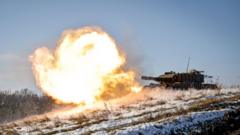The future of U.S. support for Ukraine is becoming increasingly uncertain as National Security Adviser Mike Waltz announced on Wednesday that intelligence sharing has been paused. This decision marks a vital shift in the dynamics of U.S.-Ukraine relations amid the ongoing conflict with Russia.
Waltz clarified that the U.S. has "taken a step back" in its intelligence-sharing initiatives, a change that comes on the heels of a tense interaction between President Trump and Ukraine's President Volodymyr Zelensky, where the latter was reportedly asked to leave after an intense exchange. In addition to pausing intelligence support, military assistance to Kyiv was also frozen earlier this week, contributing to the air of uncertainty.
French President Emmanuel Macron acknowledged the situation by announcing a gathering of European military leaders in Paris next week, emphasizing the necessity for Europe to prepare for a future without U.S. aid. "I want to believe the U.S. will stay at our side," he remarked, "but we must be ready if that is not the case." He further highlighted that increasing defense budgets is essential for Europe during this "new era."
Since the onset of Russia's full-scale invasion of Ukraine in 2022, the U.S. has played an instrumental role in sharing intelligence crucial for Ukraine's battlefield strategies. However, the current pause raises significant concerns about Ukraine's ability to effectively respond to ongoing Russian aggression.
The full scope and duration of the intelligence-sharing halt remain unclear. CIA Director John Ratcliffe corroborated Waltz's comments, suggesting that the pause was a means to reassess Zelensky's commitment to the peace process. Ratcliffe did express optimism about resuming collaboration, hinting that the halt could be lifted if progress is made in negotiations.
In a related briefing, White House Press Secretary Karoline Leavitt implied that the U.S. is not completely sidelining support but is merely "reconsidering" funding. The U.S. has been a critical supplier of military resources for Ukraine since the conflict began, which means that any disruption in this support could significantly impact the situation on the ground.
Experts, including Mick Mulroy, a former deputy assistant secretary of defense, have voiced concerns that halting intelligence flow may have immediate and adverse consequences for Ukraine's defense capabilities. He stated, "There is no way to replace the capabilities that the U.S. intelligence can provide from our European allies," suggesting this pause may embolden Russian forces to intensify territorial gains.
As developments unfold, the implications of this decision are likely to ripple across the geopolitical landscape, necessitating close observation of U.S.-Ukraine relations and European defense efforts in light of these changes.





















